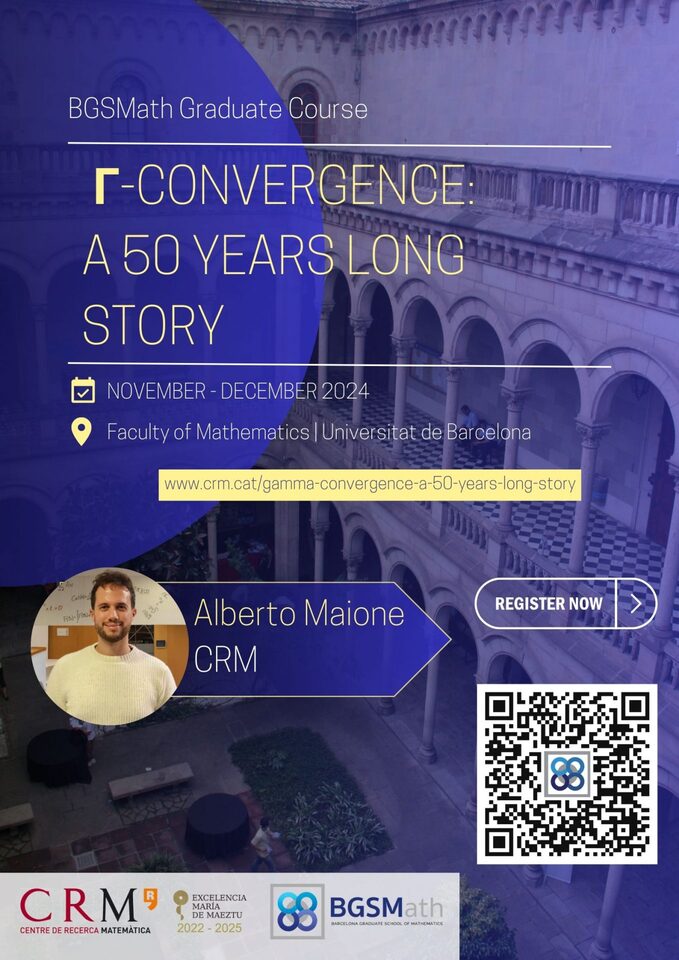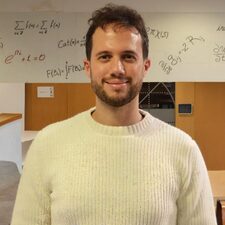Γ-convergence: a 50 years long story
Sign into December 05, 2024
*Please note that places are limited and will be allocated based on the order of registration.
Period: Tuesdays and Thursdays from November 5th to December 5th, 2024
Time Schedule: 11h to 13h
November: days 5, 7, 12, 14, 19, 21, 26, 28
December: days 3, 5
Location: FACULTY OF MATHEMATICS (Universitat de Barcelona)
Classrooms:
– Aula S4 – EH: November 5, 7, 12, 19 and 26, December 3.
– Aula B2 – EH: November 14, 21 and 28, December 5.
The Γ-convergence was introduced 50 years ago by Ennio De Giorgi and Tullio Franzoni, and occupies a prominent place in the world of variational convergences due to its applications in mechanics.
It is the commonly recognised notion of convergence for variational problems, and it would be difficult nowadays to think of any other notion of a limit than a Γ-limit, when talking about the asymptotic analysis in a general variational context.
Although other notions of convergences may suit better to specific problems (such as Mosco-convergence, two-scale convergence, G-convergence and H-convergence), it has been well understood that almost all other notions of convergence can be expressed through Γ-convergence.
For these reasons, in recent decades this topic has become of great interest in the mechanics-oriented literature as a powerful application tool for mathematicians and engineers.
In these series of advanced lectures, we devote ourselves both to the theoretical aspects of Γ-convergence, through the famous monograph by Dal Maso, and to the most famous and relevant applications in mechanics, through the monographs by Braides and Braides-Defranceschi. Lecture notes are also provided, aimed to recalling all the results discussed in class.
The main topic of the first part of the course is the Fundamental theorem of Γ-convergence by De Giorgi and Franzoni, which guarantees the good behaviour of sequences of minimizers and minima in the topology of the Γ-convergence. As an application of this result, in the second part of the course we will study problems ranging from the theory of elliptic partial differential equations (G-convergence and H-convergence), to applications in the mathematical theory of composite materials, with particular interest in the theory of periodic homogenization, and in the pioneering result of Modica and Mortola for the mathematical treatment of phase transition problems. For this now classic result, we refer to a detailed survey by Giovanni Alberti.
These lectures are recommended for students in Mathematics and early-career researchers who wish to specialise in the field of analysis. They are also intended for an audience of experienced mathematicians with some background and interest in PDEs and applications in material science.
Organiser | Speaker
Alberto Maione
Centre de Recerca Matemàtica
My name is Alberto Maione and I am a Maria de Maetzu Postdoctoral fellow (senior) at the Centre de Recerca Matemàtica (CRM) of Barcelona in the research group of Analysis & PDEs, hosted by Prof. Xavier Cabré. I come from Italy, where in 2020 I received my PhD in Mathematics from the Universities of Trento and Verona. Under the supervision of Prof. Francesco Serra Cassano and Prof. Andrea Pinamonti I wrote a PhD thesis in Calculus of variations and Partial differential equations entitled “Variational convergences for functionals and differential operators depending on vector fields”. After the PhD I moved to Freiburg im Breisgau, Germany, where I held a postdoctoral position from January 2021 to September 2023, in the research group of Prof. Patrick Dondl funded by the project SPP 2256 “Variational Methods for Predicting Complex Phenomena in Engineering Structures and Materials” of the Deutsche Forschungsgemeinschaft (DFG).
CONTENT
Sessions:
First part: Theoretical aspects of Γ-convergence
- A brief review of the Direct Methods in the calculus of variations
- The problem of the Γ-convergence
- A comparision between convergences
- A local carachterization of Γ-limits
- Γ-convergence by subsequences
- The localization argument
Second part: Applications of Γ-convergence
- Homogenization of multiple integrals
- Γ-compactness for integral functionals
- Periodic homogenization: asymptotic homogenization and cell formula
- PDEs in divergence form: the problem of the G-convergence
- Phase transition: the Cahn-Hilliard model and the Modica-Mortola theorem
REFERENCES
[1] G. Dal Maso, An introduction to Γ-convergence, Birkhäuser (1993)
[2] A. Braides, Γ-convergence for beginners, Oxford University Press (2002)
[3] A. Braides, A. Defranceschi, Homogenization of multiple integrals, Oxford University Press (1998)
[4] G. Alberti, Variational models for phase transitions, an approach via Γ-convergence, Springer (2000)
| Name | Institution |
|---|---|
| Niyaz Tokmagambetov | Centre de Recerca Matemàtica |
| Joaquim Duran i Lamiel | Centre de Recerca Matemàtica |
| Monideep Ghosh | Tata Institute of Fundamental Research |
| Alex Ferrer | CIMNE |
| Gissell Estrada | Universitat Politècnica de Catalunya |
| Nurbek Kakharman | Institute of Mathematics and Mathematical Modeling, Almaty, Kazakhstan |
| Jose Antonio Torres | CIMNE |
| Gerard Villalta i Quintana | CIMNE |
| Chunxia Tao | Beijing Technology and Business university |
| Zamurat Ayobami Adegboye | Institute of Mathematicsal Sciences and Physics, IMSP-UAC, Benin |
| Giovanna Castello de Andrade | University of São Paulo |
| Joan Domingo Pasarin | Universitat de Barcelona |
| Salim Boukfal Lazaar | Universitat Autònoma de Barcelona |
| Mittu Walia | Indian Institute of Technology Roorkee |
| Joan Verdera | Universitat Autònoma de Barcelona |
| Francesco Bozzola | University of Parma |
| Alejandro Martínez Sánchez | Universitat de Barcelona |
| Yifan Zhang | University of Ostrava |
|
For inquiries about this event please contact the Scientific Events Coordinator Ms. Núria Hernández at nhernandez@crm.cat
|





 Download
Download